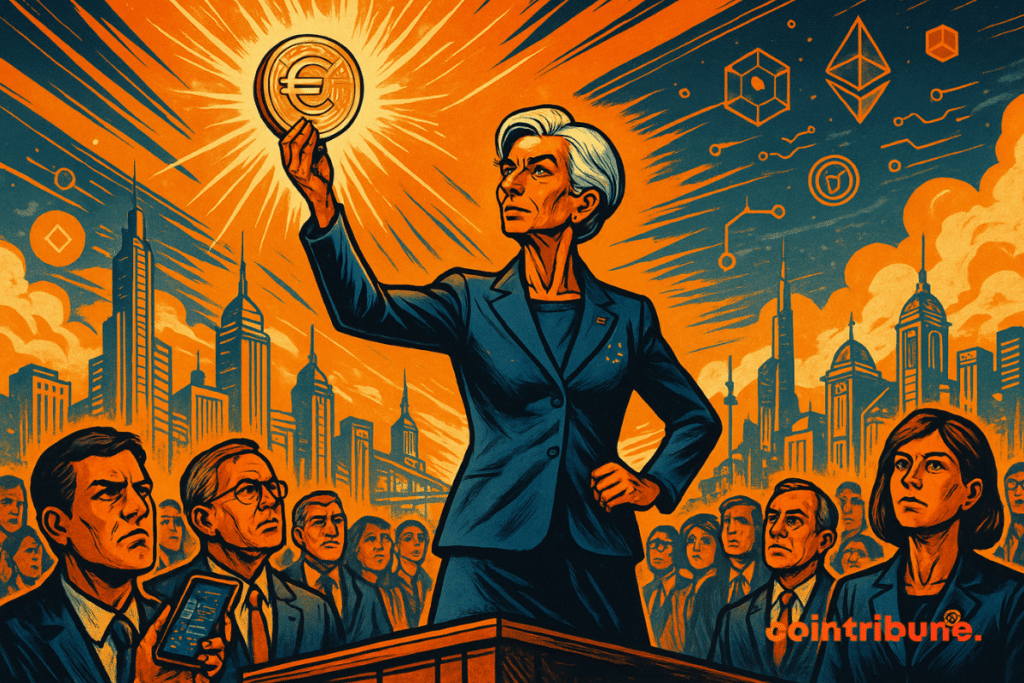Lagarde’s Euro Vision: Europe’s Bold Bid to Lead—and What It Means for Crypto
Christine Lagarde, the President of the European Central Bank, has unveiled a sweeping vision to elevate the euro’s global role. Her call for stronger economic foundations, tighter trade links, and deep institutional reform signals Europe’s bold ambition to lead in global finance—and possibly shape the future of crypto across the region.

In Brief
- Christine Lagarde called on Europe to strengthen its global influence, economy, and governance to unlock the euro’s full potential.
- The EU’s leading trade position and push for new trade deals could expand the euro’s reach and investor trust.
- Institutional reforms were proposed to streamline EU decision-making and build credibility in the euro.
Shifting Global Dynamics and the Dollar’s Challenge
Lagarde believes the euro can gain ground as the world changes and the US dollar’s dominance is questioned. This moment offers a real chance for Europe to raise the euro’s profile internationally.
She mentioned that open markets and shared rules are weakening, which puts the dollar’s long-held position under question.
This year, many investors have pulled back from the dollar, unsettled by President Trump’s unpredictable trade policies. As confidence in the US currency wavers, some are turning to Europe.
Interest in Europe has grown, especially with increased public spending, notably in Germany. This spending signals a willingness within Europe to boost growth, attracting investor attention.
Still, officials warn against a sudden move away from the dollar, fearing it could unsettle the global financial system. A careful, balanced transition is key to keeping things stable worldwide.
Currently, the euro is the world’s second most-used currency, making up around 20% of global foreign exchange reserves. By comparison, the US dollar holds approximately 58%.
Despite the interest, the latest report from the ECB shows that the euro’s use internationally stayed mostly flat in 2024. This shows how hard it is to compete with the dollar on the world stage.
Trade Influence and Europe’s Geopolitical Role
The euro’s strength depends a lot on Europe’s role in trade. The EU is the world’s largest trading group. It is the biggest partner for 72 countries, representing nearly 40% of the global economy.
Lagarde emphasised that Europe should leverage this position by pursuing new trade agreements to expand the euro’s reach. She added that investor confidence depends heavily on trust in the political and economic stability of the currency issuer. Hence, the region must build on this.
The ECB president stressed the need for a stronger economic foundation if the euro is to gain more global influence. While Europe’s debt burden is lighter than America’s—89% of GDP compared to 124% in the US—she noted that growth across the EU remains slow and uneven.
Another concern is the limited supply of top-quality, safe assets for investors, which puts the euro at a disadvantage.
To stay competitive and maintain its influence, she said Europe needs to complete its single market and create a unified capital market. Cutting red tape and encouraging cross-border investments will help.
She added that Europe should also back important industries like green tech and defence with coordinated policies. Shared funding for things like defence could also create more safe assets.
For the euro to gain in status, Europe must take decisive steps by completing the single market, reducing regulatory burdens and building a robust capital markets union. Strategic industries, such as green technologies and defence, should be supported through co-ordinated EU-wide policies. Joint financing of public goods, like defence, could create more safe assets.
Christine Lagarde, President of the European Central Bank
Institutional Strength and Governance Reform
Furthermore, Lagarde placed strong emphasis on institutional integrity. She stated that a currency’s international appeal relies not only on economic performance but also on the robustness of the systems behind it.
The ECB president admitted that the EU’s complex decision-making can be hard to understand externally. She then suggested reforms to speed up decisions. She noted:
To further drive home these advantages, we must reform Europe’s institutional structure. A single veto must no longer be allowed to stand in the way of the collective interests of the other 26 Member States. More qualified majority voting in critical areas would enable Europe to speak with one voice.
How Europe’s Strengthening Economy Could Benefit Crypto
Lagarde’s vision for a stronger Europe and a more powerful euro could have positive effects on the European cryptocurrency sector. Here are ways her focus on trade, economy, and institutions might support crypto growth.
- A stronger euro backed by solid trade ties can boost investor confidence, which may extend to crypto markets.
- Completing the single market and unifying capital markets could make it easier for crypto firms to expand across Europe.
- Improved legal and institutional stability would attract more investors to regulated crypto products.
Thus, a shift in Europe’s complex regulation could bring fresh air to both traditional finance and crypto, easing concerns that the region might fall behind in a technology it once led—an observation made by Catriona Kellas, head of legal at Franklin Templeton.
Maximize your Cointribune experience with our "Read to Earn" program! For every article you read, earn points and access exclusive rewards. Sign up now and start earning benefits.

Ifeoluwa specializes in Web3 writing and marketing, with over 5 years of experience creating insightful and strategic content. Beyond this, he trades crypto and is skilled at conducting technical, fundamental, and on-chain analyses.
The views, thoughts, and opinions expressed in this article belong solely to the author, and should not be taken as investment advice. Do your own research before taking any investment decisions.